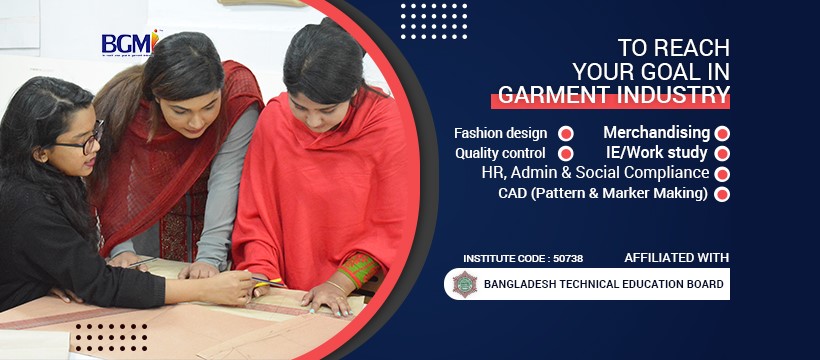
Inspired By Excellence & Innovation
We offer a wide range of high quality of teaching and extra-curricular activities.

The BGM Training Institute (BGMI) was established in 2011 with the aim of producing highly competent human resources with requisite levels of technical proficiency for Bangladesh’s burgeoning garment industry. It is operated by experts having relevant educational backgrounds and professional experience in the industry. The primary objective of BGMI is to serve the garment industry of Bangladesh by providing them with a workforce that is well-versed in state-of-the-art concepts and techniques for the industry that is necessary for it to continue competing and thriving internationally in the post-MFA era.
BGMI provides specialized services to the ready-made garments industry that helps those who avail these services to maintain modernized factories where the latest innovations in production techniques prevail under the auspices of international-standard Codes of Conduct. Through BGMI, various factories have already received international certifications such as SA 8000, ISO 9001, AA 1000, ISO 14001 as well as others, and BGMI endeavours to continue tailoring its curriculum in line with the evolution of these certifications or ethical codes.
BGMI enjoys a prime location in Uttara Model Town, one of the suburbs of Dhaka City that is able to reap the full benefits of the Bangladeshi communications network. As well as having a rail and bus station, the entrance to Uttara is marked by the country’s main international airport. Expecting the garment industry to continue to thrive, BGMI plans to continue expanding in line with the industry in the future, both academically and in terms of infrastructure.
Since its inception, BGMI has continued to maintain a high standard of academic excellence that has helped it to build a strong reputation in front of employers in the garment industry as well as those looking to find work in the industry. Almost all BGMI students manage to find work in the garment industry even before publication of their final results after completing the course requirements.
Backed by the IFC-SEDF arm of the World Bank Group, BGMI is in a good position to continue expanding in the future hand-in-hand with the garment industry that is the lifeblood of Bangladesh’s economic growth and development. It has a very specific mission, and the resources, ambition and vision necessary to enjoy continued success in achieving it. Just like the industry it serves.
THE RMG SECTOR AT A GLANCE:
The Ready-Made Garments (RMG) industry is one of the shining lights in Bangladesh’s continuing efforts towards attaining the status of a middle-income country. Not only is it the country’s largest export earning industry (since the early 90s, consistently earning more than 50% of the country’s total export earnings till this day, with a high of 76% in 1999-2000), it is also a very important contributor in terms of Bangladesh establishing social parity between its men and women, one of the targets specified for all nations in the United Nations’ Millenium Development Goals. This is because the overwhelming majority of the workforce in the Bangladeshi garment industry (estimates range from 85-90% of the over 3 million workers) is comprised of women. Every morning, at the start of each working day, and every night at the end, anyone passing by close to one of the clusters of garment factories that are situated in many parts of the capital and beyond cannot help but be astonished by the seemingly endless lines of women marching as the case might be, to or from work. These lines are the greatest testament to the manna that the garments boom has proved to Bangladesh’s development. In the wake of this boom, not only did Bangladesh’s economic growth receive an exponential boost, its unsustainable population growth also came under control (as working women are less likely to bear more children) and its women became empowered to the extent that in terms of establishing gender parity, Bangladesh is said to be doing better than many parts of neighbouring behemoth India even.
Notably, the garment industry in Bangladesh has continued to thrive even in the post-MFA (Multi-Fibre Agreement) era, as the period since 2005 has come to be known. Very briefly, the MFA was an international trade agreement in place since 1974 under which the rich countries of the West imported garment and textile goods from the various countries exporting these goods cheaply (mostly Asian nations) according to set quotas for each nation. Once the agreement expired on the 1st of January 2005, importing countries would be able to choose what amount to import from who, according to their calculations of payoff between price and quality or any other factors they wished to consider. There was a worry in the period leading up to the expiry of the MFA that the Bangladeshi garment industry would lose orders in the face of the low prices offered by Chinese or Mexican exporters or the apparently better quality offered by Vietnamese and Turkish exporters. But the industry showed its resilience by achieving a fine balance between price and quality that has allowed it to maintain, and even improve its position in the post-MFA era. The post-MFA emphasis on achieving this balance and also adherence to Corporate Codes of Conduct called for the training and retraining of potential and existing workers respectively, and hence the advent of institutions such as the one you shall read about in this brochure today: BGM Training Institute (BGMI).
Aims & Objectives of BGMI:
BGMI aims to produce versatile, resourceful practitioners for the garment industry with specific scientific, technological and practical knowledge that is particular to the industry in the 21st Century. BGMI will always endeavour to suit its aims and objectives in line with the evolving nature of the challenges posed by working in a modern environment that is sensitive to the changing faces of Globalization. Currently, its main objectives can be specified as thus:
o To develop BGMI as an international standard institute providing specialized services to the RMG sector.
o To further enhance the strength of the Bangladeshi RMG sector by providing technically-skilled human resources.
o To increase the efficiency, productivity and product value of the Bangladeshi RMG industry through development of human resources and research and development in new techniques and innovations, while at the same time providing international-standard education for the RMG sector.
o Te develop and maintain a pool of technically competent consultants comfortable with handling both local and international issues.
o To provide technical assistance in all aspects of garment manufacturing for the local apparel industry.
o To foreign partnerships with similar local and foreign institutions that facilitate the exchange of staff and students, increasing awareness of international standards of best practice and enhancing the reputation of the Bangladeshi RMG sector.
o Maintaining a close relationship with students and employers to help both fulfill their potentials.
o To provide opportunities for development and training of employees and staff in the RMG sector.
o To provide information and data about source material, and introduce state-of-the-art technology to the students and also the RMG industry of Bangladesh.
Our Honorable Teachers
Who are Glorifying BGMI Continuously

Dr. Shah Alimuzzaman Belal (CText FTI)
Prof. & Head, Dept. of Textile Engineering, Textile University

Syed Azharul Haque Kamrul
Faculty, BGMEA Institute of Fashion & Technology (BUFT)

Sumaya Sultana
Faculty, BGMEA Institute of Fashion & Technology (BUFT)

Nadia Tasnim Piya
Faculty, BGMEA Institute of Fashion & Technology (BUFT)

Afsana Sharmin
Faculty, BGMEA Institute of Fashion & Technology (BUFT)

Md. Eanamul Haque Nizam
Faculty, BGMEA Institute of Fashion & Technology (BUFT)

Md. Mahbubul Haque
Faculty, BGMEA Institute of Fashion & Technology (BUFT)

Md. Ariful Islam
Asst. Prof. BGMEA Institute of Fashion & Technology (BUFT)

Moniruzzaman Rasel
Faculty, BGMEA Institute of Fashion & Technology (BUFT)

Tanjibul Hasan Sajib
Faculty, BGMEA Institute of Fashion & Technology (BUFT)

Farhana Karim,
Assistant Professor, Shanto-Mariam University of Creative Technology

Md. Khairul Basher Bhuiyan,
AGM DBL Group, QA & Production Technologist, Wal-Mart Bangladesh

Mahbubul Hoque
Consultant & Trainer, BGMEA SEIP Project, GIZ, BGI & BAPS

Saifur Rahman Bhuiyan
Group GM, Muazuddin Group

Sardar Shajada Noor
Merchandiser, Kappahl Far East Limited

ATM Zakaria Lenin
Senior Merchandiser, Global Apparel Solutions Ltd.

Jashim Uddin Howlader
Sr. Technician, Li & Fung Bangladesh

Hadayet Ullah Mahmud
Head Of Design – R & D Department, Tex Weave

Mostakul Alom
Sr. Technician, Li & Fung Bangladesh

Kabirul Alam
Head of Business Development & Lead Auditor, AJA Bangladesh Ltd

A.T.M. Anisuzzaman
Chief executive Officer, Extensive Bangladesh

Mohammed Atiqul Islam
Head of Marketing & Merchandising, Ayman Group

Ashikur Rahman
Sr. Merchandiser, Shahi Exports pvt. Ltd.

Major Ahamudul Islam(Retd.)
General Manager. Masco Group

Engr. Md. Abul Hussain
Managing Director, Asia Link Apparels BD Ltd.


Md. Ahoshan Habib
Lead Auditor- AJA Bangladesh Ltd.

Md. Shahinur Rahman (CEO)
Strategic Sustainable Consulting & Training

Imam Hossain
Asst. Manager, NZ Group


Major Abdul Hye (Retd.)
DGM, Sintex Industries Ltd.

Ahsanullah Hasan
GM, IE & Planning, Opex Group

Md. Arafat Hossain
Design Developer, Yellow by BEXIMCO

Md. Shahadat Khandaker (Tutul)
Managing Director, DVL Denim Limited

Helal Mamun
Director, Mighty Tex Ltd.

Md. Salahuddin Khan
Sr. Inspector, Quality, SGS Bangladesh Ltd.

Abdullah Al Helal
Deputy Manager-HR, Apex footwear Ltd.

Shahabuddin Bilash
General Manager, Norp Knit Industries Ltd.
Globally Certified HR Professional (SHRM, USA)


Md. Ashikur Rahman
Sr. Merchandiser, Banga Garments Ltd.

Find Us on Social Medias